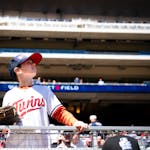Pitchers Tyler Mahle, Chris Paddack and Sam Dyson share a commonality that reflects rather questionably on the Twins. All suffered season-ending injuries pretty much right after the Twins traded for them.
For Dyson in 2019, it was a late September surgery to repair a capsule in his right shoulder, just three months after he arrived from the Giants. Paddack, who came from the Padres ahead of Opening Day this season, had his second Tommy John elbow ligament replacement surgery in May. And Mahle, a trade deadline acquisition from Cincinnati, made it only three starts before right shoulder fatigue/inflammation put him on the IL. He made a brief reappearance early this month only to go back to the IL for the remainder of 2022.
But Twins President of Baseball Operations Derek Falvey said he doesn't necessarily consider that a trend of improper injury vetting from the front office.
"You really try to assess every decision you make based on the information that you have at the time," Falvey said. "Because it's easy in hindsight to go back and say, 'Oh, this linked to this linked to this.' Sometimes, it's just not the case. I think we knew the risks that we were taking on in individual player cases. I think sometimes, you take a risk because you think it's the right risk to take. … I felt like we knew all the risks associated, and we moved forward and ultimately are comfortable with our process at the time of those decisions."
Paddack first had Tommy John surgery on his right elbow as a minor leaguer in 2016. Mahle went on the IL because of a shoulder strain about a month before the trade deadline. Falvey said he doesn't foresee Mahle's issue as long-term, and the pitcher doesn't need any surgery to fix the problem, just rest. And he said more elbow injuries are always a possibility for those who have undergone Tommy John.
More injury updates
Beyond Byron Buxton and Mahle, Falvey wasn't ready to call time on any other Twins players' seasons, even though there are 18 players on the IL.
Jorge Polanco has patellar tendinitis in his left knee and hasn't played since Aug. 27. Falvey said there is no surgery in his future. But because the second baseman is dealing with soreness, mostly when he slows down from a run, his return before the Oct. 5 regular-season finale is questionable.
Outfielder Trevor Larnach had surgery on an abdominal injury and has been on a rehab assignment. But a wrist issue has now come up, meaning he might go even longer out from his most recent appearance June 23.
"It all seems to be checking out fine," Falvey said. "… By all accounts from an image standpoint and from a hands-on exam, the initial read of that is let's just take this day to day for him and see how he's feeling."
Catcher Ryan Jeffers is also on assignment with the Saints to rehab from surgery to correct a broken right thumb and still has a chance to play again after his July 14 exit.
Max Kepler is dealing with a few sore spots, including his right wrist and some leg tightness. He hasn't played in right field since Sept. 11.
"I'm hopeful he's back before the end of the year playing," Falvey said, "because based on everything we have on him, we feel like that should be within reach."
Several of the long-term injured players should be in Minnesota next week for their final checkups after recovering in Fort Myers, Fla. One of those is starter Kenta Maeda. He had Tommy John surgery late in the 2021 season and could have made a return late this season had the Twins been in playoff contention.
"I fully anticipate a normal offseason for him," Falvey said, "and as a result, a very normal spring training to get back to pitching next year."
In general, Falvey said the staff would look at everything from the training staff to the players' individual preparation to try to diagnose why the injuries were so prevalent and lengthy this season.
"A lot of them, I don't think, were preventable," Falvey said. "I think they're things that just happen sometimes over the course of a season. … We've had some good years along the way, and we've had some rough years. Some of it's the player-specific group, and some of the risks that we've taken.
"Ultimately, that's all on me to try and figure out how we navigate that going forward. It starts with me. It doesn't start with anybody else in there. I need to go assess what we're doing organizationally, and we'll try to figure out what the right paths are forward."





